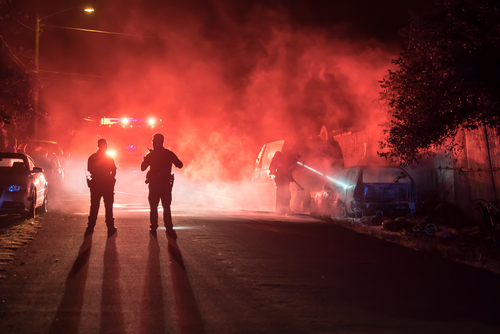Mexican drug cartels have escalated their war against American law enforcement by placing bounties of up to $50,000 on the heads of ICE and Border Patrol agents operating in Chicago.
Cartels Cross the Line Into American Cities
The Department of Homeland Security delivered a chilling confirmation on October 14, 2025: Mexican drug cartels now actively hunt American federal agents on U.S. soil. The bounties range from $5,000 for kidnapping or assault to $50,000 for assassination of high-ranking officials. This marks an unprecedented escalation from border skirmishes to organized hits within America’s third-largest city.
Chicago’s status as both a sanctuary city and major trafficking hub created the perfect storm for this confrontation. Federal agents conducting immigration sweeps face not only local political resistance but now active cartel death squads funded with cash bounties. The cartels view these enforcement actions as existential threats to their multi-billion-dollar operations.
The Price List for Violence Against Federal Agents
The cartel bounty system operates with business-like precision. Lower-level violence commands smaller payments, while eliminating senior officials triggers maximum payouts. This tiered approach reveals sophisticated planning behind what appears to be desperate retaliation. The cartels understand that removing key personnel disrupts entire enforcement operations more effectively than random violence.
Federal law enforcement sources describe the threats as credible and immediate. The cartels possess both the financial resources and operational networks to execute these contracts. Recent incidents involving federal vehicles and confrontations with crowds demonstrate the volatile environment agents now navigate daily in Chicago.
Federal Response Refuses to Retreat
DHS leadership and Trump administration officials responded with defiant statements, vowing to provide agents with necessary resources and protection. This represents a critical test of federal resolve against organized criminal intimidation. Backing down would signal to cartels that violence works as a deterrent strategy against American law enforcement.
Anyone who would put a bounty on our ICE agent's heads, should get capital punishment, IMO.pic.twitter.com/YJjEDXOgf6
— NWRain-Judi (@RYboating) October 7, 2025
Enhanced security protocols now govern agent movements and operations throughout Chicago. The federal response includes increased intelligence gathering, interagency coordination, and protective measures for agents and their families. This security apparatus requires substantial resources and may slow certain enforcement activities, which could be exactly what cartels intended.
Implications Beyond Chicago’s Borders
The Chicago bounties likely represent a test case for cartel strategy across America. Success in intimidating federal agents could trigger similar campaigns in other sanctuary cities where enforcement operations clash with local resistance. Cities like Los Angeles, New York, and San Francisco host similar dynamics between federal immigration enforcement and cartel interests.
Law enforcement experts warn that yielding to cartel intimidation would fundamentally alter the balance of power between American authorities and Mexican criminal organizations. The precedent would encourage cartels to export their proven intimidation tactics from Mexico into American cities. This development forces a reckoning about how far cartels will go to protect their American operations and whether federal law enforcement can maintain effectiveness under direct physical threat.

